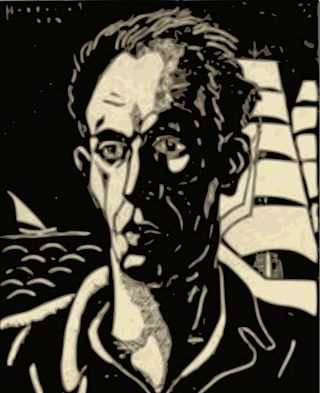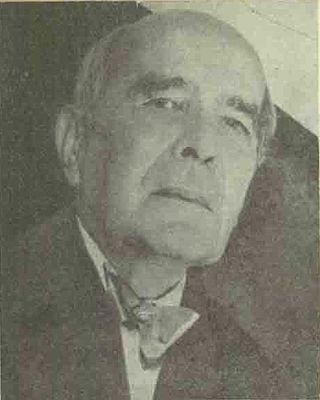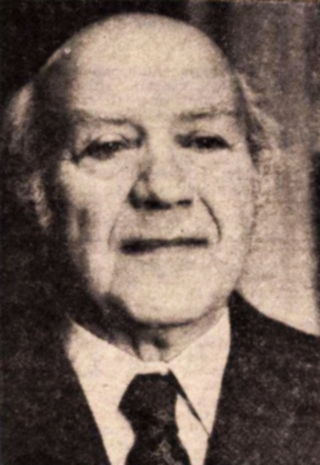
Ovidiu Papadima was a Romanian literary critic, folklorist, and essayist.
Petru Comarnescu was a Romanian literary and art critic and translator.

Al. T. Stamatiad was a Romanian Symbolist poet, short story writer, and dramatist. A late arrival on the local Symbolist scene, he was primarily active as a literary promoter and, in 1918, editor of Literatorul review. Discovered and praised by Alexandru Macedonski and Ion Minulescu, he combined his presence in radical Symbolist circles with stints on more culturally conservative ones, crossing between the extremes of Romanian literature. By 1911, he had established himself in cultural and social circles as an exotic and vocal, sometimes violent, cultural debater.
I. M. Rașcu was a Romanian poet of Symbolist verse, cultural promoter, comparatist, and schoolteacher. He is remembered for his participation in the Romanian Symbolist movement: a founder and co-editor, with Alfred Hefter-Hidalgo, of Versuri și Proză magazine, he became one of the leading Symbolist figures in his native city of Iași before 1914. In later years, he lived more discreetly as a scholar and educationist, earning both praise and opprobrium for his sternness and erudition.

Alexandru Bassarab, or Basarab, was a Romanian painter, engraver, and fascist politician. Earning his reputation for his pioneering work in linocut and woodcut, he explored neotraditionalism, Romanian nationalism, and Romanian folklore, and was ultimately drawn into politics with the Iron Guard. He helped steer several art groups associated or integrated with the Guard, contributed to its fascist propaganda, and briefly served in the Assembly of Deputies. He survived the clampdown of the late 1930s, returning to apolitical work with Grupul Grafic, and exploring the legacy of Byzantine art.

Cella Delavrancea was a Romanian pianist, writer and teacher of piano, eldest daughter of writer Barbu Ștefănescu Delavrancea, sister of architect Henrieta Delavrancea-Gibory, Niculina Delavrancea and "Bebs" Delavrancea, member of the circle of Eugen Lovinescu. She was married to diplomat Viorel Tilea during World War I (divorced), to Aristide Blank (divorced), and to Philippe Lahovary, and was one of the intimate friends of Queen Marie of Romania. She's also known for her romantic relationship with Nae Ionescu, Romanian logician and politician, spiritual mentor of the "Eliade generation".
Mihail Cruceanu was a Romanian poet.

Paul Zarifopol was a Romanian literary and social critic, essayist, and literary historian. The scion of an aristocratic family, formally trained in both philology and the sociology of literature, he emerged in the 1910s as a rebel, highly distinctive, voice among the Romanian press and book reviewers. He was a confidant and publisher of the Romanian writer Ion Luca Caragiale, building his theories on Caragiale's already trenchant appraisals of Romanian society and culture. Zarifopol defended art for art's sake even against the Marxism of his father-in-law, Constantin Dobrogeanu-Gherea, and the Poporanism of his friend, Garabet Ibrăileanu. He was also a noted censurer of neoclassical trends, of philistinism, and of inauthentic customs, advocating renewal, but not revolution. A skeptic reviewer of modernist literature, he reemerged during the interwar period as its dedicated promoter, but his preference for literary entertainment over substance and many of his literary bets were shortly dismissed by other experts of the day.

Leon Feraru was a Romanian and American poet, literary historian and translator. Cultivating proletarian literature while frequenting the Symbolist movement, he displayed both his origins in the Romanian Jewish underclass and his appreciation for the wider Romanian culture. He popularized the latter with his work in America, having left in 1913 to escape antisemitic pressures. A translator, publicist, and public lecturer, he was involved with the Romanian press of New York City, and eventually as a Romance studies academic at Columbia and Long Island. Feraru's poetry, collected in two volumes, mixes Romanian patriotism, traditionalist references, and modern industrial aesthetics.

Ionel Gherea, also known as Ioan Dobrogeanu-Gherea or Ion D. Gherea, was a Romanian philosopher, essayist, and concert pianist. The son of Constantin Dobrogeanu-Gherea, a Marxist theoretician and critic, and the brother of communist militant Alexandru "Sașa" Gherea, he was only mildly interested in politics of any kind, embracing an apolitical form of left-libertarianism. Largely self-taught, he became interested in the aestheticism of his brother-in-law, Paul Zarifopol, who became one of his main references. As a youth, Zarifopol took him to meet playwright Ion Luca Caragiale and his family, who were also influential on Gherea's writing, and the focus of his old-age memoirs. Gherea's debut as a writer was a 1920 novel written jointly with Luca Caragiale, which was also his only contribution to the genre. Following Constantin's death and Sașa's imprisonment, he had to handle family affairs, but his mismanagement of their money led him into remorseful despair; in 1924, he briefly disappeared, and was presumed to have committed suicide.

Mihail Celarianu or Celerianu was a Romanian poet and novelist. Though he wrote his first poems at the age of twelve, and had them published at thirteen, he was initially trained as a musician at the Bucharest Conservatory. He then contemplated a medical career, and studied for a degree in Paris, but returned hurriedly to still-neutral Romania upon the start of World War I; his early literary contribution include some rousing up support for the Entente Powers. The Ententist campaign was successful, and Romania declared war in 1916. Celarianu volunteered to serve in the Romanian Army, seeing action with the infantry at at Predeal Pass, before being accepted into an auxiliary position by the Air Corps. His experiences influenced his autobiographical novels, as well as a play.

Corneliu Moldovanu was a Romanian poet, prose writer and playwright.

Haralamb George Lecca, also known as Haralamb Leca, Har. Lecca, or Haralambie Lecca, was a Romanian poet, playwright and translator. He belonged to an upper-class family, being the grandson of artist Constantin Lecca and brother of genealogist Octav-George Lecca, as well as nephew and rival of writer Ion Luca Caragiale. He had an unsettled youth, studying medicine and law for a while, and also reaching a Sub-Officer's rank in the terrestrial army. He debuted in literature under the guidance of Bogdan Petriceicu Hasdeu, who also employed Lecca's services as a medium. His early work was in poetry, often outstandingly macabre, evidencing his familiarity with 19th-century French literature and hinting at a vague affiliation with Symbolism. Briefly a collaborator of Junimea society, then of its dissident wings, Lecca never joined the fledgling Symbolist movement, and spent his later life in relative isolation from all literary circles.

Adrian Maniu was a Romanian poet, prose writer, playwright, essayist, and translator.
Aurel Chirescu was a Romanian poet.
Vlaicu Victor Virgil Bârna was an Austro-Hungarian-born Romanian poet.

Mircea Constantin Demetriade was a Romanian poet, playwright and actor, one of the earliest animators of the local Symbolist movement. Born in Oltenia to a theatrical family, he largely gave up on a similar career to become a bohemian writer. He associated with, and was inspired by, Alexandru Macedonski, building on early romantic influences at Literatorul magazine. Later, he incorporated borrowings from Charles Baudelaire and Arthur Rimbaud, two of the authors Demetriade would translate into Romanian.
George Dorul Dumitrescu was a Romanian prose writer and columnist.

Magda Isanos was a Romanian poet.

Dan Simonescu was a Romanian literary historian, bibliographer, folklorist, and librarian. His debut was in his late teens, when he accompanied Constantin Rădulescu-Codin during fieldwork in Muscel County, publishing his first contributions in the field of Romanian folklore. After graduating from the University of Bucharest in 1925, and publishing his first book, a collection of articles, in 1926, he became an assistant professor at his alma mater, and was also employed as a librarian by the Romanian Academy. Simonescu joined an editorial team headed by senior scholars Ioan Bianu and Nicolae Cartojan, and, in the 1930s and 1940s, became a major contributor to the collection and publication of old Romanian literature; he was also Cartojan's disciple, though the two disagreed on a parallel project, namely the publication of Mihail Kogălniceanu's collected works, with Simonescu favoring, and eventually putting out, a topical selection of Kogălniceanu's social-themed essays. His own first major contributions were his doctoral thesis, which explored court ceremonials in the Danubian Principalities, and a paper on the emergence of historiography in Early Modern Romania.














